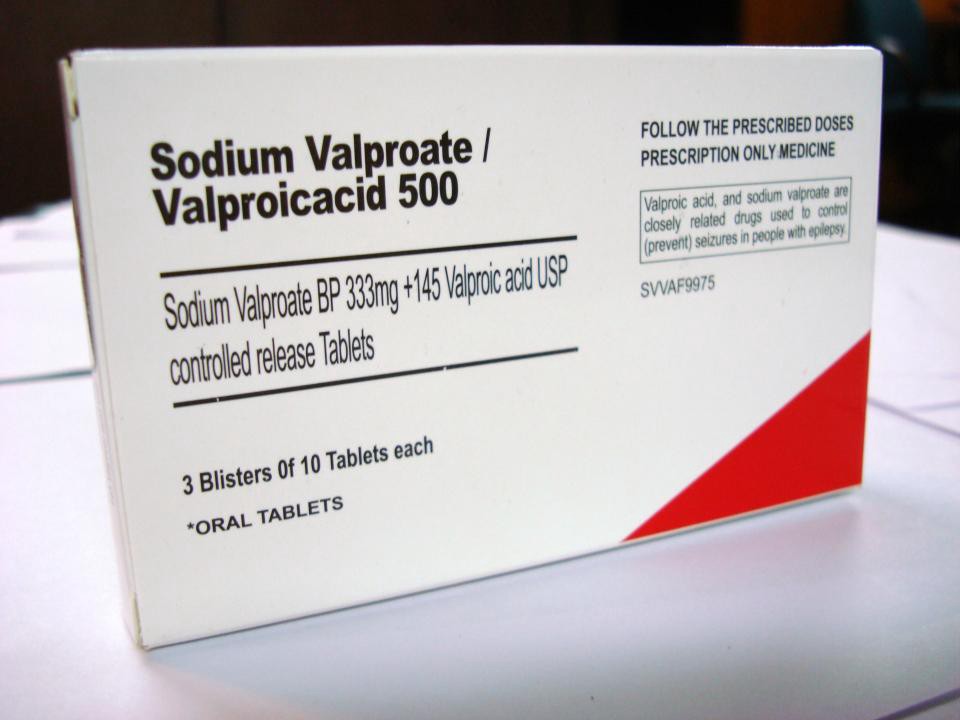A recent study led by researchers at the The University of Texas Health Science Center at Houston examined the effects of the drug valproate on brain volume in children diagnosed with pediatric bipolar disorder. Their findings, published in Psychiatry Research: Neuroimaging, demonstrate that brain volume decreased in the amygdala, a region associated with emotion processing functions, over a six-week period.
 Sodium valproate (VPA), commonly marketed under the brand names Depakote and Epilim, is a drug prescribed to individuals diagnosed with bipolar disorder. While some studies suggest that valproate is associated with protective factors and plasticity in the brain, others do not support this finding. Trials conducted on animals have found that valproate may decrease brain cell growth in regions associated with memory and lead to cognitive impairment.
Sodium valproate (VPA), commonly marketed under the brand names Depakote and Epilim, is a drug prescribed to individuals diagnosed with bipolar disorder. While some studies suggest that valproate is associated with protective factors and plasticity in the brain, others do not support this finding. Trials conducted on animals have found that valproate may decrease brain cell growth in regions associated with memory and lead to cognitive impairment.
Nevertheless, these studies have mainly examined the effects of valproate on adults diagnosed with bipolar disorder. The researchers of this study sought to investigate further the mechanisms of valproate in children diagnosed with pediatric bipolar disorder (PBD). Neuroimaging scans were used to examine several brain regions pre and post valproate administration. The valproate was titrated to standard clinical levels over a six-week period.
“VPA was started at 250 mg orally twice daily, and titrated as clinically appropriate, on a weekly basis, to reach therapeutic levels (valproate 50–125 ng/mL),” the authors explain.
The sample included 14 children (mean age = 13.43 ± 3.05 years old), 10 of which were males. Criteria included participants that were not taking medication for the two weeks prior, except for lorazepam and ADHD drugs, and that participants met DSM-IV criteria for BD I, BP II or BP-NOS disorder. Other inclusion and exclusion criteria featured details about participants’ medical history and co-occurring diagnoses, among others.
Results demonstrated a decrease in brain volume over time across all participants in a region associated with emotion processing. This interaction effect between time and brain changes was significant in the amygdala.
These contradictory findings, the authors note, could be a result of varying dosages of valproate used across studies.
“Our findings may also appear against the neuroprotective and neurotrophic effects of VPA reported in the literature,” they write.
They suggest future research to explore these results:
“Future large-scale, placebo-controlled, randomized studies with a longer treatment period (>12 weeks) are needed to explore this interpretation and confirm our results which are limited by the short treatment period. It would provide insight into the short and long-term effects of VPA on treatment response and brain developmental trajectory in PBD.”
****
Cazala, F., Suchting, R., Zeni, C. P., Bauer, I. E., Mwangi, B., Wu, M. J., … & Soares, J. C. (2018). Effects of Valproate on brain volumes in pediatric bipolar disorder: a preliminary study. Psychiatry Research: Neuroimaging. (Link)















I can think of few things as despicable as experimenting in this way on children, especially if they do a more extensive study.
Report comment
I agree, Eric. More extensive experimentation on children with this drug is a deplorable idea. Especially given the reality that many or most of the children diagnosed with PBD are actually children who had the adverse effects of the ADHD drugs and antidepressants misdiagnosed as bipolar, even according to the DSM-IV-TR, and Robert Whitaker’s research.
“Note: Manic-like episodes that are clearly caused by somatic antidepressant treatment (e.g., medication, electroconvulsive therapy, light therapy) should not count toward a diagnosis of Bipolar I Disorder.”
https://www.alternet.org/story/146659/are_prozac_and_other_psychiatric_drugs_causing_the_astonishing_rise_of_mental_illness_in_america
Here’s a little from the drugs.com site regarding Depakote:
“Antiepileptic drugs (AEDs), including Depakote, increase the risk of suicidal thoughts or behavior in patients taking these drugs for any indication.”
“There is no body of evidence available from controlled trials to guide a clinician in the longer term management of a patient who improves during Depakote treatment of an acute manic episode … there are no data to support the benefits of Depakote in such longer-term treatment.”
“Valproate can cause fetal harm when administered to a pregnant woman.”
“Valproate can cause decreased IQ scores following in utero exposure.”
“Cases of life-threatening pancreatitis have been reported in both children and adults receiving valproate.”
The dangerous effects of this drug go on and on:
https://www.drugs.com/pro/depakote.html#s-43678-2
Thus, “Future large-scale, placebo-controlled, randomized studies with a longer treatment period” is a very BAD idea. Because when “Their findings … demonstrate that brain volume decreased in the amygdala, a region associated with emotion processing functions, over a six-week period,” meaning harm was done in the short run.
This, of course, implies even more harm will likely be done in a long-term study. So children should NOT be experimented on in this manner. These researchers have lost their minds.
Report comment
Six weeks, that’s horrible. And I can imagine what it does to the adult brain. I would assume the same but at a longer time frame. I’m surprised they even published this study.
Report comment
Can someone redo the link so you can look at the data and the statistical analysis. The “link” at the end of the article sends you to the page but you can only access the abstract. Thanks in advance.
Report comment
Abstracts are useless.
Report comment
szasz is correct (again). Psychiatry=brain damage.
Report comment
Maybe the profession should start off aiming to PREVENT brain damage by stopping this practice until it is proven safe, rather than continuing to potentially damage millions of brains until someone proves it is not.
What happened to “First, do no harm?”
Report comment
When I’ve invoked this phrase I’ve had doctors tell me that it isn’t really part of the Hippocratic Oath that they take.
Report comment
And to do it to innocent children is deplorable, never mind adults. The new tally for Pharma is 450 Billion in revenue. Hopefully they will implode.
Report comment
As far as I know if a person comes off these drugs carefully with non drug support (Yoga, Meditation, Exercise, “CBT”, “Talking Treatments”) – they can make Full Longterm Recovery.
This view is also supported by the British Psychological Society.
(I discontinued Lithium in 1982).
Report comment
so much wrong w this, from Dx children w BiP and using antiepileptic drugs rebranded as “mood stabilizers” …this drug is not approved by FDA (I know, I know) for children so if it were a serious attempt at research, they would need to have a lot of participants but this is just a nonsense (seeding or marketing) study to confuse further and push this drug…even in adults it is approved for mania and poorly rated for mania and not for symptoms of depression in BiP with very short studies…plus Depakote is actively discouraged for women by those researchers working in epilepsy due to many neuro issues with pregnancies, and low IQ in exposed children…psychiatry can ignore all of this…info on marketing studies here https://www.theguardian.com/commentisfree/2011/jul/01/bad-science-drug-trials-seeding-trials
Report comment
Gosh. A disorder that they don’t know exists, a drug they don’t know how it might work, and now they don’t know if it works at all.
But in just over a month it shrinks the amygdala by 2.5% and decreases 5 out of 7 brain volumes measured.
Not exactly neuroprotective is it ?
Report comment
Very scientific, eh?
Report comment
“Criteria included participants that were not taking medication for the two weeks prior, except for lorazepam and ADHD drugs…”
The real name of this study:
“A Role for Depakote in Emergent Bipolar Disorder in Children with Treated with Benzodiazepines and Amphetamines”
Follow-up:
“Treatment of Depakote-Induced, Amygdala-Mediated Anxiety and Inattention in Bipolar Children: Successful Interventions with Benzodiazepines and Amphetamines”
Meanwhile, in adult psychiatry:
Pharmacological Treatments for Stress and Work Performance Deficits in Parents of Bipolar Children
Report comment
Wow, good catch! I totally missed that point. I like you titles, too – more honest.
How about: “Making money by inducing brain damage with one drug and selling another drug to “treat” the damage.”
Report comment
Did y’all know that researchers use sodium valproate/valpruic acid/depakote to create autism models in rodents…it’s a pretty well established so-called “translational” model now for magically divining autism treatments. I remember a time when I could see faces and feel emotions through other people’s emotional expression. I have facial memories of people before and around the time of the depakote, but ever-decreasingly after and I think it’s to do with not really seeing emotions in faces, when I have contact with someone I remember more, I even developed the strategy of covering my face in fights with partners so they could understand what information I have to work with when we fight. Ironically I was on depakote for bipolar and BPD which themselves were misdiagnosed complex post traumatic stress-related episodes (I don’t like the word disorder) during my resurfacing as a human being after being drugged with ritalin (I’m told I called it the zombie drug, though I don’t remember) from 6-12 yo for ADHD (I demedicated myself and got an ODD diagnosis for it…proudly) the source of my trauma.
Does anyone know of others with similar complaints concerning the depakote, more to the point more researchers that are looking into this kind of effect on people?
Autism model in rats with depakote:
https://www.ncbi.nlm.nih.gov/pubmed/28324861
Report comment
Wow, so it sounds like they are INDUCING autism-like symptoms as a “treatment”? And they consider this helpful?
Report comment